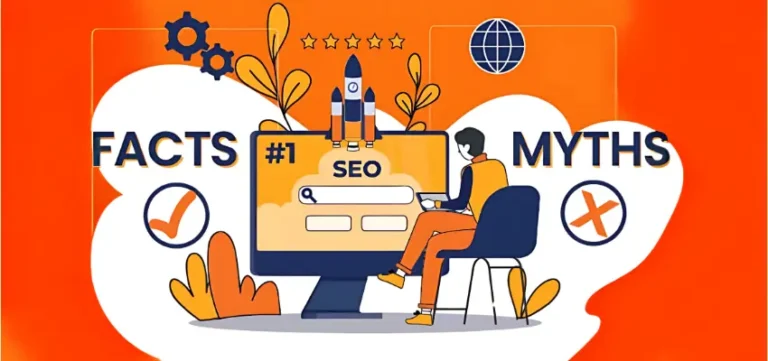SEO is constantly evolving, but many outdated myths continue to circulate, leading businesses and marketers to make poor optimization decisions. As search engines refine their algorithms, it’s essential to separate fact from fiction. In this guide, we’ll debunk some of the most common SEO myths in 2025 and provide insights into what actually works.

Common SEO Myths Debunked
1. Keyword Stuffing Still Works
Some people still believe that cramming as many keywords as possible into a webpage helps rankings. However, Google’s algorithms, including RankBrain and BERT, prioritize natural language processing and user intent. Instead of stuffing keywords, focus on semantic SEO and user experience.
What to Do Instead: Use LSI keywords and natural keyword variations within high-quality content. Learn more from Google’s Search Central Blog.
2. More Backlinks Always Mean Higher Rankings
While backlinks are an important ranking factor, the quality of backlinks matters more than quantity. Spammy or irrelevant backlinks can harm your SEO, and Google’s Penguin algorithm actively penalizes manipulative link-building strategies.
What to Do Instead: Focus on earning high-authority backlinks from reputable sources. Learn more in The Role of Backlinks in SEO and Google’s Link Spam Update.
3. Exact Match Domains (EMDs) Boost Rankings
In the past, websites with exact match domains (e.g., “bestcheaplaptops.com”) had an advantage. However, Google has devalued EMDs that lack high-quality content and authority.
What to Do Instead: Choose a brandable domain and focus on creating valuable content rather than relying on your domain name. Read Google’s stance on Exact Match Domains.
4. You Need to Publish Content Daily to Rank
Consistency in content creation is important, but quality matters more than frequency. Publishing low-value content every day can dilute your authority.
What to Do Instead: Create comprehensive, evergreen content that addresses search intent. Learn how in Topic Clusters in SEO and Google’s Helpful Content Update.
5. Meta Keywords Still Impact Rankings
Meta keywords have been irrelevant for years. Google and Bing ignore them entirely, and using them doesn’t improve your SEO.
What to Do Instead: Focus on writing compelling meta descriptions and optimized page titles that improve click-through rates. Read Google’s official stance on Meta Keywords.
6. Longer Content Always Ranks Better
There’s a misconception that longer content automatically ranks higher. While longer posts tend to cover topics in depth, word count alone is not a ranking factor.
What to Do Instead: Prioritize content depth, structure, and readability rather than focusing solely on length. Read Google’s Core Ranking Systems for guidance.
7. AI-Generated Content is Penalized
With the rise of AI tools like ChatGPT and Bard, many believe AI-generated content is penalized. Google’s Helpful Content Update states that AI content is fine as long as it provides value.
What to Do Instead: Use AI as a content assistant, but always ensure human editing and fact-checking. Read more on Google’s Guidance on AI Content.
8. Zero-Click Searches Are Bad for SEO
Zero-click searches (where users get answers directly on Google) are often seen as bad for websites. However, ranking in featured snippets and Google’s Knowledge Graph can increase brand visibility and drive traffic in different ways.
What to Do Instead: Optimize for featured snippets and structured data. Read more in Zero-Click Searches: How to Adapt and Search Engine Journal’s Snippet Guide.
9. Google Only Ranks Fresh Content
While Google values fresh content for certain queries (e.g., news), many pages rank for years without updates. Evergreen content remains valuable as long as it stays relevant.
What to Do Instead: Update outdated pages with new data, statistics, and insights rather than constantly creating new pages. Read Google’s Freshness Algorithm.
10. Social Media Signals Directly Impact Rankings
Social media engagement does not directly affect SEO rankings, but it helps in indirect ways by increasing brand awareness and traffic.
What to Do Instead: Use social media to promote content and generate organic backlinks. Read Google’s Take on Social Signals.
11. Local SEO Isn’t Necessary for Online Businesses
Even if you operate online, local SEO can help you build trust and authority by leveraging Google My Business, local citations, and geo-targeted keywords.
What to Do Instead: Optimize for local search with Google My Business and local link-building strategies. Read Google’s Local Search Ranking Guide.
What Actually Works in 2025?
Now that we’ve debunked common myths, let’s focus on strategies that drive real results:
User Experience (UX) and Core Web Vitals matter more than ever. Read Core Web Vitals in 2025.
High-quality, authoritative content is still king.
E-E-A-T (Experience, Expertise, Authoritativeness, and Trustworthiness) plays a huge role in SEO rankings.
Schema Markup and Structured Data help improve visibility in search results.
Conclusion
SEO in 2025 is about quality, authority, and user experience—not outdated tricks. Avoid falling for these common SEO myths and focus on strategies that actually work.
Is your website following outdated SEO tactics? Get a free SEO audit today!
